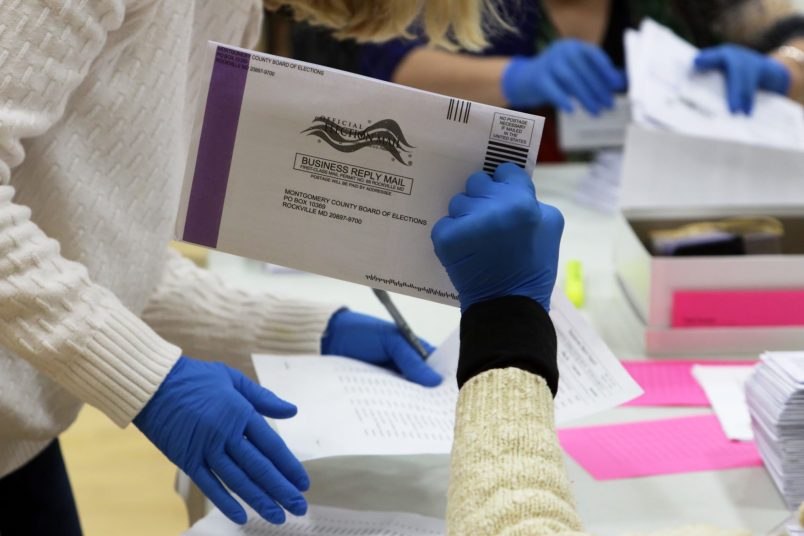In the aftermath of the 2020 election, extremist candidates, state legislatures and disgruntled Trump supporters have come together to attack election workers. Among the fruits of their labor are a collection of new laws across the country that impose strict new penalties on election workers — in some cases for minor mistakes, or for carrying out their work in the way they have in past elections.
At least six laws in five states — Alabama, Arizona, Kentucky, Missouri and Oklahoma — create new penalties for election workers, according to a Brennan Center for Justice analysis outlining new voting restrictions that have been enacted during this year’s legislative session.
The penalties for these new rules aren’t light, either: At least half of them threaten election workers with felony convictions.
Two such laws were passed in Arizona, a state that has become ground-zero for attacks on election administration: H.B. 2237 prohibits same-day voting registration while H.B. 2492 requires that election officials ensure that voters provide “satisfactory evidence of citizenship” to cast their ballot.
Arizona’s laws both threaten Class 6 felonies, which can result in a prison sentence of up to 5 or 6 years.
The laws “criminalize basic human error,” said Tammy Patrick, a senior advisor to the Elections program at the Democracy Fund and a former Arizona elections administrator.
“In some states, if you mail out information that turns out to be incorrect or have a proofing or transcription error, those would then be criminal activities,” she told TPM.
The charges, ironically, could also imperil an election worker’s right to vote: While Arizona does automatically restore voting rights to formerly incarcerated citizens upon release, they only regain that right once they’ve completed their prison sentence or probation.
“By turning something that might be an innocent mistake or disagreement about how to interpret the law into a criminal act,” Gowri Ramachandran, senior counsel to the Brennan Center’s Democracy program, told TPM, “it increases the temperature and makes election officials concerned that they’re going to get blamed and threatened for things that people don’t like.”
“Election officials, of course, always strive for 100% accuracy and correctness,” Patrick said, “but elections are conducted by people and people can make mistakes.”
The severity of these penalties have already led some election workers to leave their jobs. Ramachandran recalled the case of Roxana Moritz, a chief election officer in Davenport, Iowa, who resigned from her position last year after Iowa enacted a new voting law in February 2021.
Iowa’s S.F. 413 shortened the early voting period from 29 days to 20 and closed polls an hour earlier. But it also imposed fines on poll workers of up to $10,000 for making any “technical infractions” that violate the state’s election rules or guidance from the secretary of state, and made it a felony to disregard election guidance from the secretary of state.
Before the law was passed, Moritz gave poll workers hazard pay for working through the pandemic, but failed to get approval for granting $9,400 in extra pay. “I could be charged with a felony. I could lose my voting rights,” she told the New York Times last June. “So I decided to leave.”
The new rules couldn’t have come at a worse time for election workers, as thousands across the country have either been flooded with death threats or manipulated by partisan actors trying to control the process from within.
Another Brennan Center study from March found that twenty percent of the local election officials they surveyed were “very” or “somewhat unlikely” to stay in their positions through to the 2024 presidential election.
“There’s an ongoing weaponization of election administration,” Patrick notes. “They’re again trying to pull in this narrative that the 2020 election was illegitimate, and that’s why they have to pass these kinds of laws, to curtail all of the supposed rampant fraud that occurred when in reality there was no rampant fraud.”
Ramachandran believes that the departure of election administrators like Moritz hints at an unfortunate pattern to come. “It’s just making an even more difficult environment for election workers when we know that it’s already such an intense environment for them,” she told TPM.
“It’s a tough job,” she said. “We want people who are really committed to it to continue.”







WTF is that supposed to mean? It’s surely a statute open to manipulation and abuse by a disreputable secretary of state, not that any of those exist in red states.
It’s disgusting that so many in this country have declared open warfare on free and fair elections.
Guess I will need my birth certificate, passport, driver’s license and a blood sample to vote.
… … … … … …
“Two such laws were passed in Arizona, a state that has become ground-zero for attacks on election administration: H.B. 2237 prohibits same-day voting registration while H.B. 2492 requires that election officials ensure that voters provide “satisfactory evidence of citizenship” to cast their ballot.”
Satisfactory evidence of citizenship being a valid Free Fascists of America membership card.
What will scotus say? If the state legislature says it’s so - then it’s so?
So what is a “citizen” supposed to look like? Only White GOPers can vote now? Screw that shit. In a sensible world those who author laws like H. B. 2492 would get hounded out of the legislature by the members themselves. But Arizona has has a GOP majority in both state chambers since 1969.
It’s the response to losing elections.